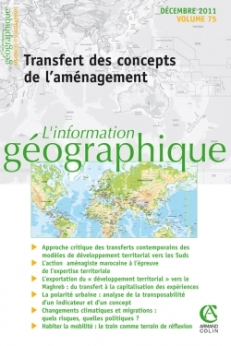
L'information géographique - Vol. 75 (4/2011)
Pour acheter ce numéro, contactez-nous
Recevez les numéros de l'année en cours et accédez à l'intégralité des articles en ligne.
Depuis plus de dix ans, la France développe des actions de coopération avec les pays du Maghreb dans le champ du développement territorial. La construction de ressources territoriales y serait, là comme ailleurs, un mode d’adaptation des économies aux conséquences de la mondialisation. La description des contextes des transferts et l’analyse de leur contenu permettent d’interroger le concept de projet de territoire et sa transférabilité. Celle-ci est fortement limitée par la faiblesse du processus de décentralisation mise en oeuvre dans ces pays, et pose la question de l’autonomie territoriale comme condition à la révélation puis au développement de ressources spécifiques. Face à ces difficultés, le processus de capitalisation des pratiques et de l’expérience permettrait d’apporter des réponses au travers de la construction de connaissances territorialisées. Cela nécessiterait de profondes modifications dans la conception puis la mise en oeuvre des actions de coopération.
For more than ten years, France has developed cooperation programmes in the field of territorial development with North African countries. In these developing countries, the construction of territorial resources is supposed to be a mode of economic adaptation to the consequences of globalisation, as it is the case in occidental countries. The description of the contexts of the transfer of this development model and the analysis of its contents allows us to question the French concept of project of territory and its transferability from Occident towards the Global South. Its transferability seems to be strongly limited by the weak degree of decentralization of these countries. In fact, this paper argues that the autonomy of the public sector at subnational level is an essential precondition for the revelation and the development of specific territorial resources. The capitalization of practises and experiments through the construction of territorialised knowledge could allow overcoming these constraints. This, however, would require deep modifications in the design and the implementation of international cooperation projects.